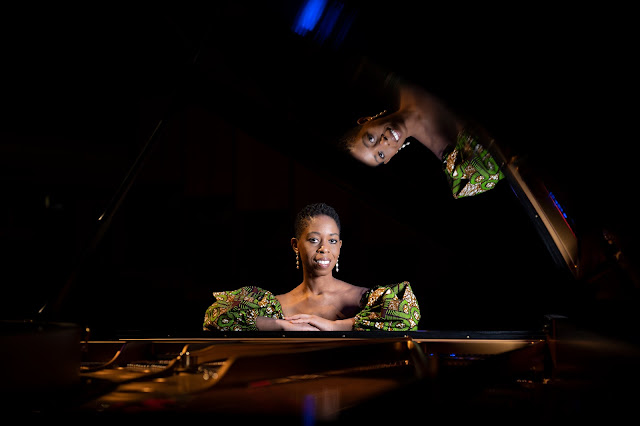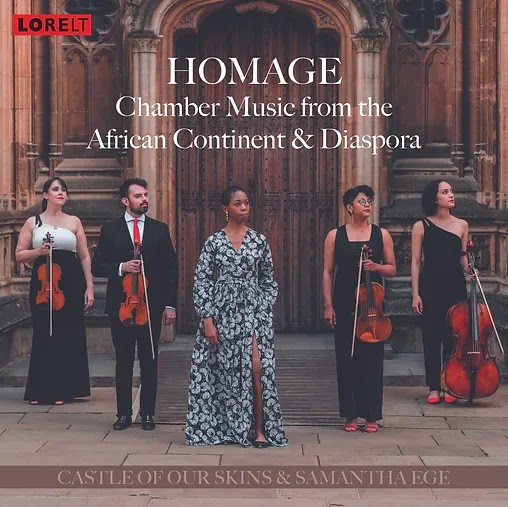 |
| Samantha Ege (Photo Jason Dodd) |
Pianist and musicologist Samantha Ege is known for her championing of the music of Florence Price and the other composers associated with her such as Margaret Bonds. Samantha's recordings have included Fantasie Nègre, devoted to the piano music of Florence Price (1887-1953), and Black Renaissance Woman, focusing on the music of the Chicago Black Renaissance between the wars with works by Florence Price, Margaret Bonds, Nora Holt, Betty Jackson King and Helen Hagan.
Samantha's most recent disc, Homage, with the string quartet Castle of our Skins features chamber music from the African Continent and the Diaspora with music by the South African composer Bongani Ndodana-Breen, and the American composers Zenobia Powell Perry (1908-2004), Undine Smith Moore (1904-1989), and Frederick C. Tillis (1930-2020) and the British composer Samuel Coleridge Taylor.
Homage came about because Samantha had the opportunity to work with Castle of our Skins, a string quartet that has championed a lot of Black classical composers so their and Samantha's interests align. Castle of our Skins had worked in Boston with the South African composer Bongani Ndodana-Breen and Samantha knew of his work, so the disc contains his piano quintet, Safika: Three Tales on African Migration. In this work, Ndodana-Breen (born in 1975) was writing retrospectively about Apartheid in South Africa. Samantha thought that it would be illuminating to also include Undine Smith-Moore's piano trio Soweto in the programme. Smith-Moore was not South African, but politically active at the time Apartheid was happening.
Frederick C. Tillis' Spiritual Fantasy, also on the disc, is also about the idea of memory, taking spirituals as a form of archive of Black memory, whilst Zenobia Powell Perry's Homage comments on the music of Tillis. And Coleridge Taylor's Moorish Dance explores history, as Samantha sees it as redefining the meaning of the title but empowering the term Moor with a grandiose piece of music.
Samantha's engagement with the work of these Black classical composers started when she was an undergraduate and spent a year studying at McGill University in Canada, and there she was amazed to discover that classical music had a history of Black women composers. She learned about Margaret Bonds and Florence Price and found more to explore in their histories. She realised that these women were not isolated anomalous figures but part of a community. She became determined to highlight this Black Renaissance school, based around this community of women living in and around Chicago during the exciting inter-war era. And she felt that it was important that we did not squeeze their story into an existing narrative that they don't belong to. They belong to a distinct era in American cultural history.
 |
| An undated photograph of Florence Price in later life with her daughter Florence Louise Robinson (University of Arkansas Libraries) |
Chicago at the time was full of a very concentrated and particular energy, as a result of the Great Migration, and the Depression and Black community was very segregated. The women from this group of composers surrounding Margaret Bonds mostly passed away early in their 50s and 60s, during the 1940s and 1950s. And whilst it is significant that these women leading an artistic community made space for other women, times changed and the era was not duplicated so that Florence Price, Margaret Bonds and the others had no direct heirs and their music was forgotten.
In fact, some music that is known to exist has disappeared and a major cache of Florence Price's music was only found again, in an attic of an abandoned house, in 2009. Samantha is optimistic that there will be more music found, in particular, it would be illuminating if we could hear more music by Nora Holt and Helen Hagen, and of course the more the music is played and known, the more people will recognise the names in apparently unknown music. This is what happened with the recent cache of Florence Price's music; a couple saw the pile of manuscripts in the attic of a hitherto abandoned house, Googled Price's name and the information they found validated the idea that the music should not be thrown away. Dozens of hitherto unknown Price pieces were found, including her two violin concertos and her fourth symphony.
As a pianist, Samantha has championed Price's four Fantasies nègres (written between 1929 and 1937), which are large-scale virtuosic pieces, and Price's Symphony No. 1 has become popular. But the symphony was written for the Rodman Wanamaker Competition, in 1932; it took first prize and was premiered by the Chicago Symphony Orchestra. But, as Samantha points out, this work was written to satisfy the demands of a competition, to show Price's mastery of form. Her three later symphonies, written between 1935 and 1945, offer a lot more insight into her compositional voice. In the Fantasies nègres and the later symphonies, Price is not constrained by the competition, and shows a voice that is freer, more expressive and coming from a different place to Symphony No. 1.
Samantha is currently working on a book about Florence Price and the network surrounding her, these women were behind the scenes activists who helped Price to become the composer that she developed into. This is a narrative about Race Women in classical music. Middle-class Black Women with a sense of social responsibility that merged into the music making, this was not art for art's sake. Music could be uplifting and could inspire the younger generation. These women used music in a distinct way, there was a social-political edge to what they were doing that was very different to White women and men in music at the time.
One composer that Samantha would like to explore more is Undine Smith-Moore. She belongs to a generation after Price, and their social arcs are different. Smith-Moore was working class and came of age during the Black Renaissance period, but later she experienced a very different form of political activism in the civil rights movement.
Samantha has played the piano since the age of three, but she did not explicitly intend to be a concert pianist and she only had one year at a conservatoire studying piano (when she was at McGill University). But she discovered telling history through music at McGill, opening her eyes to the idea of combining musical performance and stories, and this also expanded the idea of what she could write about as a musicologist. When she did a PhD on the music of Florence Price this included lecture recitals, combining musicology and performance. Then people became interested in her as a separate performer, though it helped that she was uploading videos of her performances to YouTube, and it was these that led to her first album, of Florence Price's music. For Samantha, performing and musicology feed into one another, and she can't do one without the other.
Samantha will be performing Florence Price's Piano Concerto with the Oxford Philharmonic Orchestra, conductor Cayenna Ponchione-Bailey at the Sheldonian Theatre in Oxford (22/4/2023).
Then she will be playing the Concerto for Piano and Strings (1948) by English composer Doreen Carwithen (1922-2003) with the Arkansas Symphony Orchestra, conductor Matthew Kraemer (6-7/5/2023). This performance came about because Samantha was invited to Arkansas, but knew that they had already programmed the Price concerto, so Samantha liked the idea of championing a British woman composer from the same era.
She had been keen to champion Carwithen's music before and plans to do the concerto again. Samantha had not known of Carwithen until she was Googling concertos for piano and strings for a concert in 2020 (that was, in the event, cancelled). She was gripped by the music of Carwithen's concerto, for its expressivity and it was a bold introduction to the music of the composer. A similar thing happened with Price, when she first came across Price's music it spoke to her so music that she wanted to convey to audiences.
Homage: Chamber Music from the African Continent & Diaspora - Samantha Ege, Castle of our Skins - LORELT LNT147
Never miss out on future posts by following us
The blog is free, but I'd be delighted if you were to show your appreciation by buying me a coffee.
Elsewhere on this blog
- NYCGB Young Composers 4: NMC's annual collaborations with NYCGB results in an anthology disc of eight striking and challenging new works in superb performances by the young singers - record review
- Seductive and magical moments: Sam Cave's exploration of music for the contemporary guitar enchants and intrigues - concert review
- Pianist Clélia Iruzun is the focus of this new disc of music by Nimrod Borenstein featuring his Concerto written for her - record review
- The Golden Road to Samarkand: the Britten Sinfonia brings together two very different musical explorations of the Middle East - record review
- From Paderewski to Edmund Finnis: Le piano symphonique's daring double-concert in Lucerne - concert review
- New music should not be seen as extra-terrestrial, it should not generate fear: I chat to composer Ana Sokolovic, artistic director of the Société de musique contemporaine du Québec - interview
- Fluidity and intimacy: Martha Argerich in Schumann's Piano Concerto at Le Piano Symphonique festival in Lucerne - concert review
- Unexpected creativity: cellist Margaret Maria and soprano Donna Brown talk about the joys of collaboration on the words and music of their album Between Worlds - interview
- Galina Grigorjeva: Music for Male-Voice Choir - record review
- Peter Grimes in Paris: a powerful performance from Allan Clayton as he leads the Paris revival of Deborah Warner's striking production - opera review
- A virtuosic cascade of ecstatic and endless deep listening: The Hermes Experiment with Shiva Feshareki - concert review
- Home












No comments:
Post a Comment